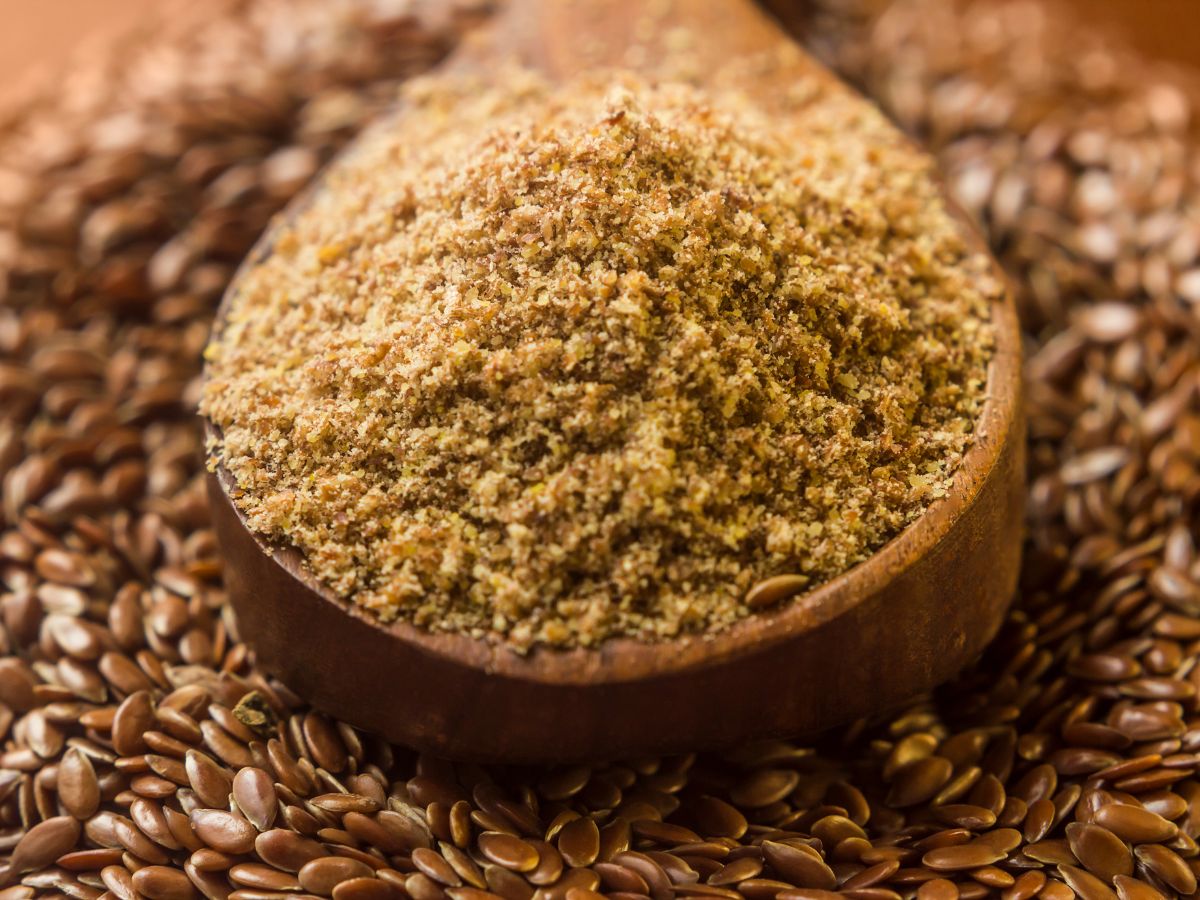From chia to hemp, the super seed world is filled with an abundance of healthy competition. However, the benefits of flaxseed set it apart from the rest. As one of the oldest crops in the world, flaxseed provides a range of advantages, such as improving heart health, lowering cancer risk, reducing cholesterol, enhancing digestion, and relieving arthritis symptoms. Incorporating flaxseed into your diet offers unparalleled health benefits.
Better Hunger Control with Flaxseeds

If you tend to nibble between meals, consider adding flaxseeds to your drink to combat food cravings.
A study found that including 25 grams of ground flaxseeds in a drink reduced hunger and overall appetite. This reduction in appetite is likely due to the fiber content in flaxseeds, which slows down digestion in the stomach, triggering hormones that control hunger and provide a feeling of fullness.
The dietary fiber in flaxseeds may also help you feel full for a longer period, aiding in weight management by controlling cravings.
Flaxseeds for Heart Health
Flaxseeds are rich in omega-3 fatty acids, beneficial in maintaining heart health. These seeds contain a high amount of a compound called ALA, which has been shown to reduce the risk of heart diseases in several studies.
The healthy fat in flaxseeds reduces inflammation in the arteries, which often leads to heart issues such as stroke, heart attacks, and cardiac arrest.
Lower Cancer Risk with Flaxseeds
Flaxseeds are abundant in lignans, plant compounds with estrogen and antioxidant properties, both of which are known to lower the risk of developing various cancers.
The lignan content in flaxseeds is up to 8000 times higher than in other plant foods. Studies have shown that daily consumption of flaxseeds can reduce the risk of breast cancer, prostate cancer, colon cancer, and skin cancers.
Better Diabetes Management through Flaxseed

Flaxseed is a rich source of both soluble and insoluble dietary fiber, helping maintain normal blood sugar levels in people with diabetes.
A study found that daily intake of flaxseed improves glycemic control in individuals with pre-diabetes. It also decreases glucose and insulin levels and enhances insulin sensitivity as part of the habitual diet.
Enhances Muscle Buildup in Men
Flaxseeds are an excellent superfood for bodybuilders, providing 25 to 30 grams of protein per 100 grams. The ALA compound in flaxseeds enhances insulin sensitivity within muscle cells, preventing fat storage in muscle tissue.
Flaxseed oil is also an excellent energy source, particularly for athletes and those who burn more calories during workouts.
Research has shown that a daily intake of 30 grams of flaxseeds may benefit men with a precancerous prostate condition by reducing tissue growth.
Flaxseeds for Better Digestion

Flaxseeds contain both soluble and insoluble dietary fibers, which help bulk up stool and ensure easy passage of the bowel.
Soluble fiber softens stool, while insoluble fiber stimulates the digestive system, promoting easy bowel movement. Eating flaxseeds daily can benefit individuals with constipation and irritable bowel syndrome.
However, it is essential to drink plenty of fluids throughout the day when including these seeds in your diet.
Reduces Cholesterol Levels
While eating flaxseeds cannot replace cholesterol-lowering medications for those who need them, several studies have shown that consuming flaxseeds may help fight high cholesterol.
During digestion, the soluble fiber in flaxseed binds cholesterol and pushes it out of the body, lowering cholesterol levels in the blood.
Eating 30 grams of flaxseed powder daily for three months has been shown to lower total cholesterol by 17% and “bad” cholesterol by nearly 20%.
Relieves Arthritis Symptoms

According to the Arthritis Foundation, flaxseeds are essential in reducing joint pains and stiffness, especially for those suffering from lupus, rheumatoid arthritis, and Raynaud’s phenomenon.
The effectiveness of flaxseeds in alleviating these ailments can be attributed to their anti-inflammatory properties.
Consuming just 1 tablespoon of flaxseeds daily can significantly help your body fight arthritis-induced pain.
Reduces Radiation Impact on the Body
Flaxseed nutrition has a profound effect on tissue repair in your body. A study found that flaxseed intake can help individuals recover from radiation damage and may be highly effective in reversing lung damage induced by intense chemotherapy or radiation therapy.
Since these treatments usually incur heavy tissue damage, regularly eating flaxseeds can be very helpful in reducing such damage.
A Good Source of Vitamins and Minerals
Flaxseeds provide essential micronutrients, although the serving size is usually small. Based on a 2,000-calorie-per-day diet, a serving of flaxseed provides 11% of the daily recommended intake (DRI) of thiamin, a water-soluble vitamin needed for neural function. A tablespoon of flaxseed also contains 2% of the DRI of niacin, vitamin B6, and folate.
In terms of minerals, a tablespoon of flaxseed provides 13% of the DRI for manganese and about 10% for magnesium. Other minerals include phosphorus (7% of DRI), copper (6%), and selenium (4%). (Verywellfit)
Flaxseeds for Healthy Hair and Skin
A well-functioning digestive system and gut indicate reduced inflammation in your body, which reflects on your skin. Eating anti-inflammatory foods like flaxseed has been shown to lead to a clearer complexion.
Additionally, your hair and nails can benefit from flaxseed’s rich mineral content. The seed is high in omega-3 fatty acids, B vitamins, and vitamin E, which contribute to strong nails and faster hair growth.
How to Add Flaxseeds to Your Diet

Flaxseeds come in several forms, including whole flax, pre-ground or milled flax, and flax oil. Whole flax has the longest shelf life but needs to be ground in a food processor or coffee grinder before consumption. Pre-ground flax saves time but has a shorter shelf life.
Flax oil is full of fatty acids but lacks the fiber found in flaxseed. Here are some ways to add this amazing super seed to your diet:
- Thickener in Recipes: Use flax as a natural gluten-free thickener in baked goods.
- Egg Substitute: Replace eggs in recipes with finely ground flaxseed (1 tablespoon flaxseed + 3 tablespoons water per egg).
- Smoothies: Add a tablespoon or two of ground flaxseed meal to your smoothie or shake.
- Baking: Incorporate coarsely ground flaxseeds into cookies, muffins, pancakes, and quick breads for added texture and nutrition.
- Salads: Drizzle flaxseed oil over roasted vegetables or add chopped seeds as a topping.
- Snacks: Sprinkle flaxseed oil on popcorn or mix ground meal with herbs and spices to make crackers or baked chips.
- Oatmeal: Shake ground flaxseed meal overcooked oatmeal or chia pudding.
- Granola and Breakfast Bars: Add ground flax meal to homemade energy bars or granola recipes.
While flaxseeds offer numerous health benefits, other seeds also provide significant nutritional advantages. Learn more about these by exploring related content.
Conclusion: Embrace the Power of Flaxseed for Optimal Health
The benefits of flaxseed make it an exceptional addition to your diet. It improves heart health, lowers cancer risk, reduces cholesterol, and enhances digestion.
Additionally, try including other nutrient-rich foods like chia seeds and pumpkin seeds to enjoy even more health benefits.





